2015 Ram 1500 Crew Cab: Car Seat Check

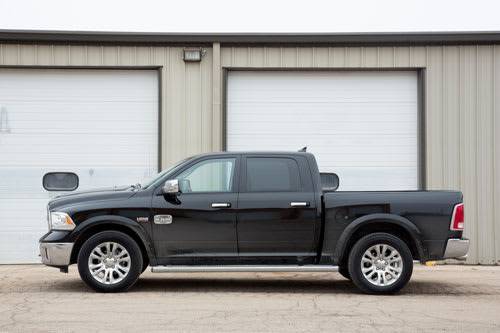
Utility has many meanings when you’re talking about the Ram 1500. Sure, it’s capable in terms of its role as a pickup truck with its robust V-6 and V-8 engines and myriad combination of cab and bed sizes, but it also shines as a family hauler. We tested a crew-cab Ram in the upscale Laramie Longhorn trim and it easily and comfortably accommodated three child-safety seats in its gigantic backseat.
How many car seats fit in the Dodge Ram’s second row? Three
What We Like
- There was enough room in the Ram’s rear passenger seats for three car seats and we had enough space between each seat to comfortably maneuver them.
- The rear-facing convertible and infant seats installed easily and had plenty of room in the second row. There was no need to move the front passenger seat forward to accommodate either seat.
- The outboard seats’ two sets of Latch anchors sit about a half-inch into the seat bight. The leather cushions on the Laramie Longhorn model Ram truck are stiff, but it wasn’t too tough to push past them to connect to the anchors.
- The booster carseat fit well thanks to some light seat bolstering that held it snuggly in place. The vehicle’s head restraints only go up a small amount, but they didn’t get in the way.
What We Don’t
- The forward-facing convertible cars seat fit well on the Dodge Ram’s seat, but connecting to the truck’s top tether anchor (which is really a strap) was awkward, although the owner’s manual explained it well. There are three tether straps behind the truck’s head restraints. To use them, we had to raise the back seat’s head restraint, weave the car seat’s tether strap through the opening under the head restraint and then route the strap to the middle seating position’s tether anchor strap. It’s a bit tough to tighten once it’s connected because of the strap’s angle. There are also hooks in the Dodge Ram’s ceiling; parents shouldn’t get them confused with top tether anchors.
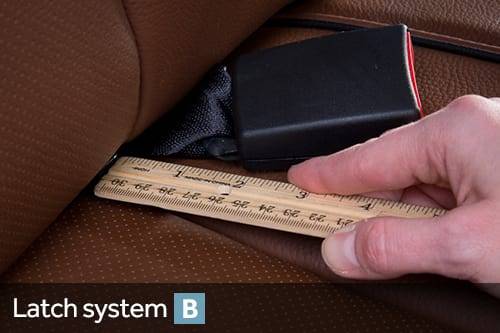
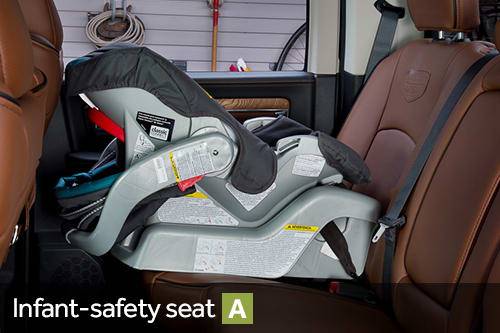
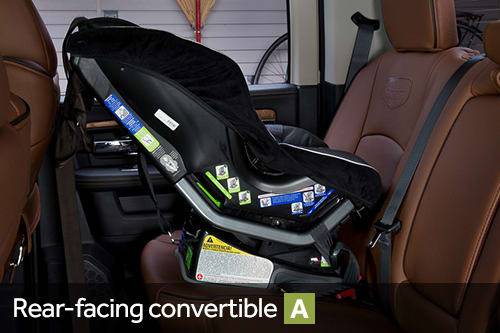
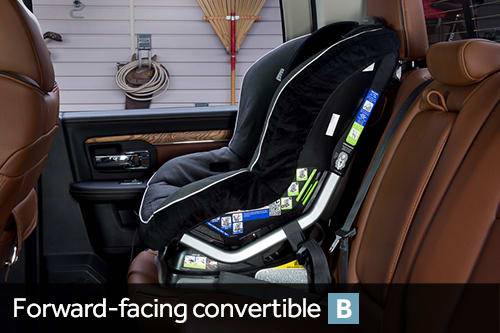
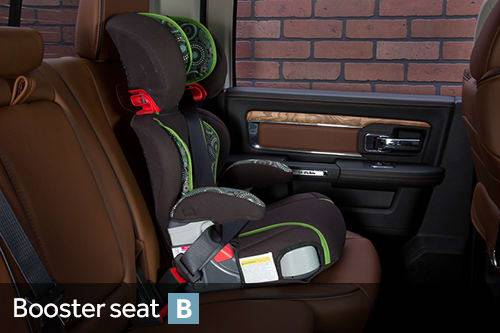
Grading Scale
A: Plenty of room for the car seat and the child; doesn’t impact driver or front-passenger legroom. Easy to find and connect to Latch and tether anchors. No fit issues involving head restraint or seat contouring. Easy access to the third row.
B: Plenty of room. One fit or connection issue. Some problems accessing third row when available.
C: Marginal room. Two fit or connection issues. Difficult to access third row when available.
D: Insufficient room. Two or more fit or connection issues.
F: Does not fit or is unsafe.
About Cars.com’s Car Seat Checks
Editor Jennifer Newman is a certified child safety seat installation technician. Editor Jennifer Geiger is working on renewing her certification.
For the Car Seat Check, we use a Graco SnugRide Classic Connect 30 infant-safety seat, a Britax Marathon convertible seat and Graco TurboBooster seat. The front seats are adjusted for a 6-foot driver and a 5-foot-8 passenger. The three child seats are installed in the second row. The booster seat sits behind the driver’s seat, and the infant and convertible seats are installed behind the front passenger seat.
We also install the forward-facing convertible in the second row’s middle seat with the booster and infant seat in the outboard seats to see if three car seats will fit; a child sitting in the booster seat must be able to reach the seat belt buckle. If there’s a third row, we install the booster seat and a forward-facing convertible. To learn more about how we conduct our Car Seat Checks, go here.
Parents should also remember that they can use the Latch system or a seat belt to install a car seat, and that Latch anchors have a weight limit of 65 pounds, including the weight of the child and the weight of the seat itself.
Cars.com photos by Evan Sears

News Editor Jennifer Geiger joined the automotive industry in 2003, much to the delight of her Corvette-obsessed dad. Jennifer is an expert reviewer, certified car-seat technician and mom of three. She wears a lot of hats — many of them while driving a minivan.
Featured stories




